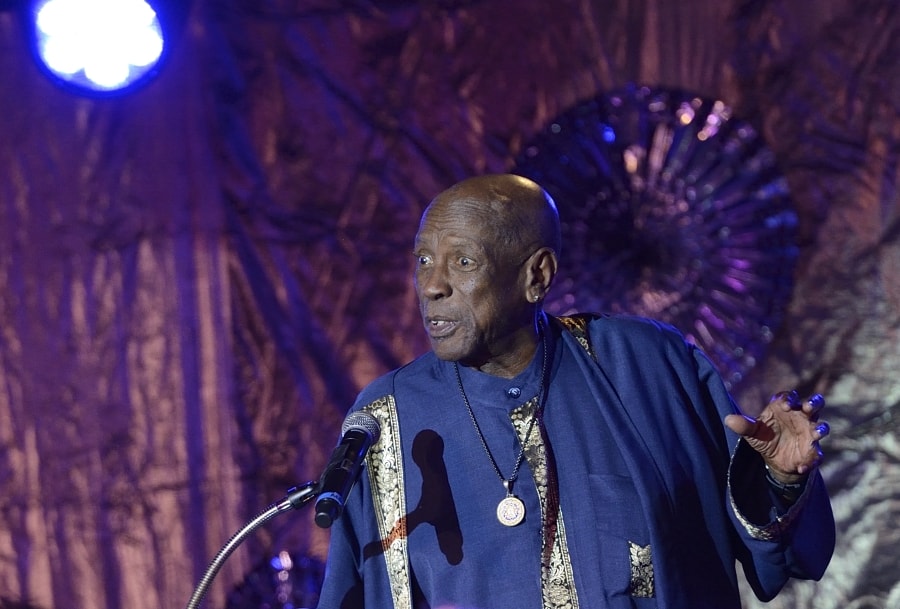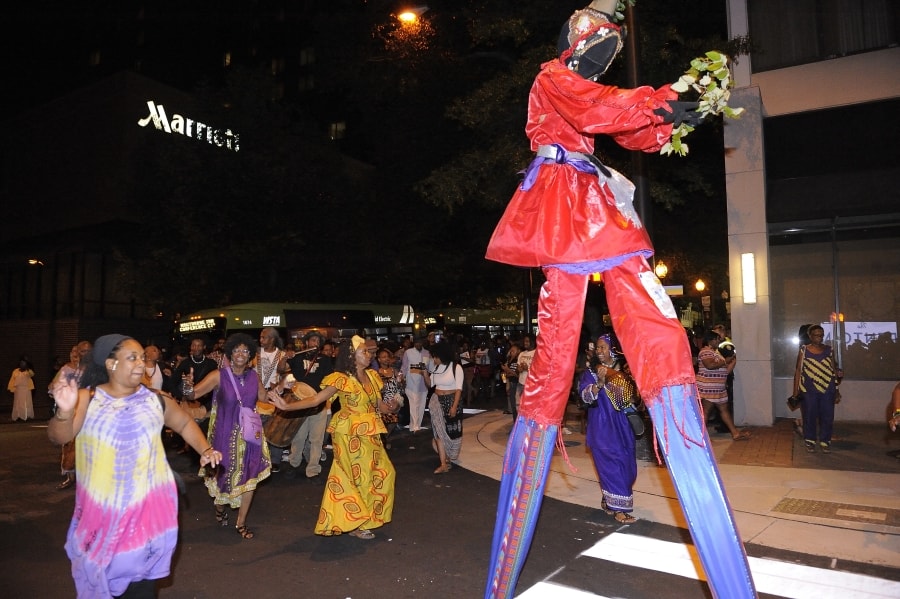It’s 11 o clock at night. You’ve been up since 6 a.m. catching films, attending workshops, watching shows, and meeting luminaries of the American theatre. You need sleep, but there’s a meet-and-greet to get to, a midnight poetry reading, and at 1 a.m. Obba Babatundé is doing a staged reading. Maybe at 3 a.m. you can finally get some shut-eye?
Such are the sweet dilemmas of the National Black Theatre Festival (NBTF), the largest Black theatre festival in the world, held biennially in Winston-Salem, N.C. The next one will be held July 29-Aug. 3, and programming will include a film festival, a teen showcase, workshops, seminars, an international colloquium, several dozen mainstage productions, and a fringe festival.
“Everybody has FOMO [fear of missing out] that week,” says Jackie Alexander, artistic director for North Carolina Black Repertory Company, which produces the festival. This will be Alexander’s second time helming it. When he started with NC Black Rep in 2016, organizing for the 2017 festival was already underway, but Alexander managed to add a health fair, and NC Black Rep produced two mainstage productions.
“I bit off quite a bit,” he says. “Maybe more than I should have.”
This year NC Black Rep will present Jelly’s Last Jam as part of the festival, featuring several members of the original Broadway cast. They’ll also be producing a staged reading of a new work by Nambi E. Kelley about the life of Maya Angelou. Alexander says he plans to reduce the festival’s overall number of mainstage productions to focus on quality over quantity. In 2017 there were 35 mainstage shows; this year the number will be 25.
“We want to make sure that all of the historical Black theatres around the country that have been making an impact are represented,” Alexander says. “We’re going to really focus down on the best plays that get submitted.”
Submissions were due at the end of January, and Alexander says that for mainstage productions alone NC Black Rep received more than 100, including several from international presenters. Submissions for staged readings, of which there will be more than 40, have just closed, and other deadlines—the fringe festival for collegiate theatres, the youth talent showcase, the film festival, etc.—are sprinkled throughout the spring.
Despite the decrease in mainstage offerings, Alexander says that this could be the biggest NBTF yet, due to the addition of other new programming. For starters, NC Black Rep will partner with the North Carolina School of the Arts and the Arts Council of Winston-Salem to stage a free Shakespeare play at an outdoor ampitheatre daily from 5:30 to 7:30 p.m., precisely between the matinee and evening performances of the festival’s mainstage shows. “It’s going to be a great way to introduce the community to the festival,” Alexander says.
Other new programming, as well as the full mainstage production lineup, will be announced June 4. Despite not knowing what the full lineup will be, many festivalgoers have obviously already booked their rooms: The hotels in downtown Winston-Salem that week are sold out.
“The people are coming,” Alexander says. “A lot of people make it their family reunion. They see old friends. The weekend before the festival, the National Black Theatre Network always holds their conference in Winston-Salem. So we’ve got academics talking about the history of Black theatre; we’ve got professionals who are working in Black theatre talking about it. It’s a way of keeping it alive, and that’s really what the goal of the festival is.”
Mentoring is another important part of keeping Black theatre alive. So for the 2017 festival, Alexander introduced a special meet-and-greet bringing together playwrights with directors, and artistic directors with commercial producers, including from Broadway. This year he plans to announce a new playwriting competition to keep fostering these connections.
“Discovering new voices, connecting people—I really want to focus on making sure people connect,” Alexander says. His focus on mentorship is inspired by his own career, which has been guided by mentors who helped him do things he’d never thought possible. Jazz musician Weldon Irvine helped Alexander produce his first film, Joy, in 2002. Marjorie Moon, executive director of the Billie Holiday Theatre in Brooklyn, N.Y., encouraged Alexander to write his first play, The Desire, and produced it. Woodie King, founder of New Federal Theatre, gave Alexander some of his first theatre directing jobs.
“These people weren’t making money off of me,” he says. “They had no reason to help, really, other than they wanted to. I feel this is my way of paying it forward.”

In addition to paying it forward, Alexander is interested in looking back at the history of North Carolina Black Repertory Company and the festival. Not all of the community members know that the company is the driving force behind the festival.
“People say, ‘Oh, we have to keep the festival alive,’” Alexander says. “If you want to keep the festival alive, you have to keep the company alive, because the festival can’t live without the company.”
Alexander hopes to make that connection clear. Especially because, in the spring of 2018, the NC Black Rep lost its space. After being in temporary spaces for a few months, the company has found a new location in downtown Winston-Salem. The space race curtailed NC Black Rep’s season last year, but the new location is right where the festival has always been held (various downtown locations). Alexander hopes this will give the NC Black Rep more visibility.
The history of both the company and the festival are milestones in American theatre. Larry Leon Hamlin founded the NC Black Rep in 1979 as the state’s first Black theatre. The festival came 10 years later, with Maya Angelou serving as the first chairwoman. August Wilson and Oprah Winfrey both attended and were honored at the opening night awards ceremony. Since then stars, including Sidney Poitier, Ruby Dee, Lou Gossett Jr., and Denzel Washington, have attended, performed, or been honored.
“It’s never been documented, the history of it,” Alexander says. “We’ve got footage from years and years from Dr. Angelou to Harry Belafonte, all these people who have been through.”
Alexander and a production team will be working on a documentary, due out in 2021, about the festival and North Carolina Black Repertory Company.
The celebrities, the attention, and the sheer breadth of the festival has firmly established it as one of the nation’s most important arts events. And this year the festival turns 30. (Since it’s a biennial, that means this is the 16th festival.) Alexander wants to continue that legacy, and hopes to produce another groundbreaking festival that will bring together both the storied luminaries of Black theatre and the up-and-comers.
“It’s exhilarating,” he says, envisioning the festival week to come. Then he laughs, and adds: “And exhausting.”
Rosalind Early is the associate editor of the alumni magazine for Washington University in St. Louis and a freelance theatre critic for St. Louis Magazine.


